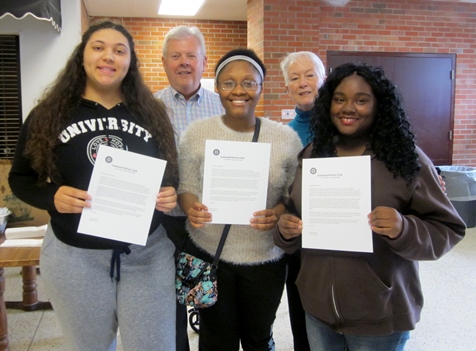KDHE continues with abstinence-based program; counties can pursue PREP grants
by Andy Marso, KHI News Service
Public health officials in Wyandotte County and Johnson County say they are seeking funds to continue comprehensive sexual education programs into 2018 after the state declined to renew a federal grant.
Kansas is one of seven states that decided not to take funding this year from the Personal Responsibility Education Program, also known as PREP. The federal program provides grants for a sex education curriculum that the Centers for Disease Control certified as evidence-based to prevent teen pregnancy and sexually transmitted diseases.
The other states that declined the funds this year were Florida, Indiana, North Dakota, South Dakota, Texas and Virginia. Missouri received $973,624.
The PREP funding began in 2010 as part of the Affordable Care Act. It provides an alternative to federal Title V funds, which pay for abstinence-based sexual education.
Kansas traditionally has applied for and received money for both programs. The state then funnels the money to local governments and school districts that request it.
The state has received almost $500,000 in PREP funds in each of the past five years before declining any this year. State officials accepted almost $600,000 in additional Title V abstinence-education grants this year.
Two PREP counties
The health departments in Johnson County and Wyandotte County have been the main users of programs funded by the PREP grants.
“We got it in the public schools, and it’s been really successful,” said Greg Stephenson, a personal health services manager with the Wyandotte County Public Health Department. “The schools love it.”
Stephenson said PREP teaches abstinence as a means of preventing pregnancy and disease transmission. But the program also provides information on things like contraception and sexual consent.
He said the state’s decision not to take PREP funds means the programs are funded through most of 2017 but in limbo after then.
“It’s disappointing to us, but I don’t know what to do,” Stephenson said.
Lougene Marsh, director of the Johnson County Department of Health and Environment, said her agency was similarly disappointed.
She said teens who get pregnant are less likely to graduate and more likely to live in poverty than those who don’t.
“If teens don’t know how to prevent pregnancy and sexually transmitted diseases, they’re bearing an exorbitant cost for the lack of investment of funding,” Marsh said.
Cassie Sparks, a spokeswoman for the Kansas Department of Health and Environment, said the state decided not to draw down PREP funds this year because Johnson County and Wyandotte County were the only counties using them and the state wanted those counties to apply directly to the federal government.
“Removing KDHE as the coordinator would allow for direct interactions between the true grantee and the grantor,” she said, “thereby removing KDHE as the intermediary.”
Sparks said the counties have enough time to make that transition.
Stephenson and Marsh both said they would try to access PREP funds that way, but they weren’t sure if it was possible. The federal government generally has granted PREP funds only to state agencies.
Both also said they would petition their county commissioners to consider funding the programs with local dollars, but a property tax lid that the Kansas Legislature imposed makes that a long shot.
Pregnancy rates declining
Teen and adolescent pregnancy rates have declined in Johnson County — from 11.1 per 1,000 girls 19 and under in 2010 to 7.9 per 1,000 in 2014 — and Wyandotte County — from 44.8 per 1,000 girls 19 and under in 2010 to 29.4 per 1,000 in 2014 — since they began using PREP, but Stephenson and Marsh said it’s too early to tell how much of that decline can be attributed to the program itself rather than other factors.
The rates have been declining in Kansas as a whole and nationwide over that same period.
Stephenson and Marsh said they did not believe the state’s decision to turn down future funds was based on any analysis of the effectiveness of PREP.
“I assume it must have been controversial politically,” Stephenson said, “because those abstinence-only grants were controversial (as well).”
Marsh said some schools in her county have asked the health department not to deploy PREP at their locations. Others, like the Shawnee Mission School District, have opted to use the program under the administration of district employees rather than health department employees.
Marsh said a Shawnee Mission school was participating in PREP in 2014 when it used a poster describing ways people express sexual feelings that quickly became a lightning rod for criticism.
The poster was taken down after parents complained about how explicitly it named sexual acts. Socially conservative legislators continued to take issue with the poster years later, introducing a bill in February inspired by it that would have allowed for prosecution of teachers who present material “harmful to minors.”
Vanessa Sanburn, co-founder of a nonprofit sexual education organization in Lawrence called Let’s Talk, said some legislators yearn to return to the days of abstinence-only sex education, and that likely influenced the state’s decision to turn down PREP funds.
She said that’s problematic.
“Kids are sexually active,” said Sanburn, who’s also a member of the Lawrence school board. “We know that, and not acknowledging that and not providing the tools they need to prevent pregnancy and STDs … that’s not going to prevent them from being sexually active.”
The nonprofit KHI News Service is an editorially independent initiative of the Kansas Health Institute and a partner in the Heartland Health Monitor reporting collaboration. All stories and photos may be republished at no cost with proper attribution and a link back to KHI.org when a story is reposted online.
– See more at http://www.khi.org/news/article/kansas-declines-some-federal-sex-education-funds#sthash.Ns24X1dv.dpuf

